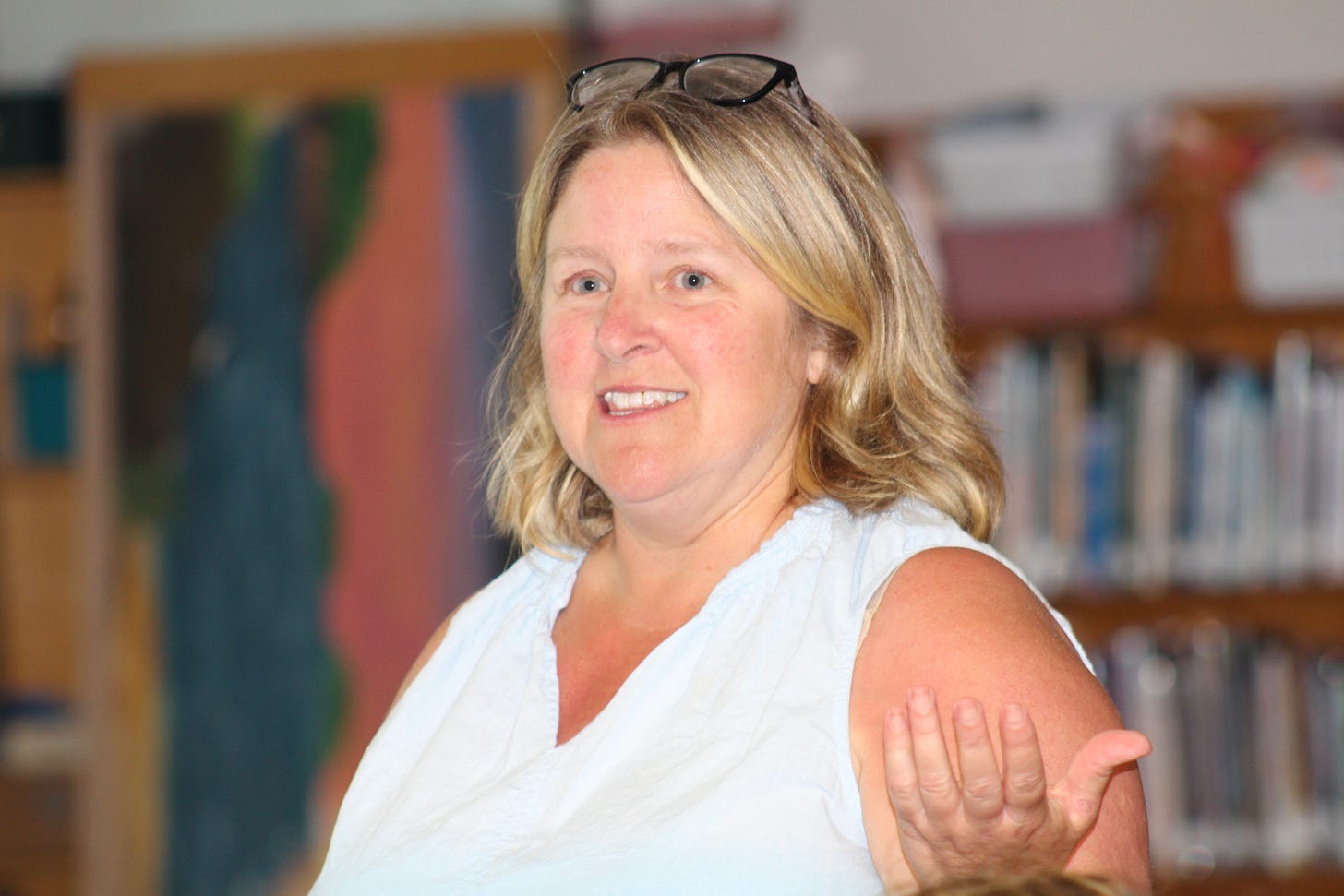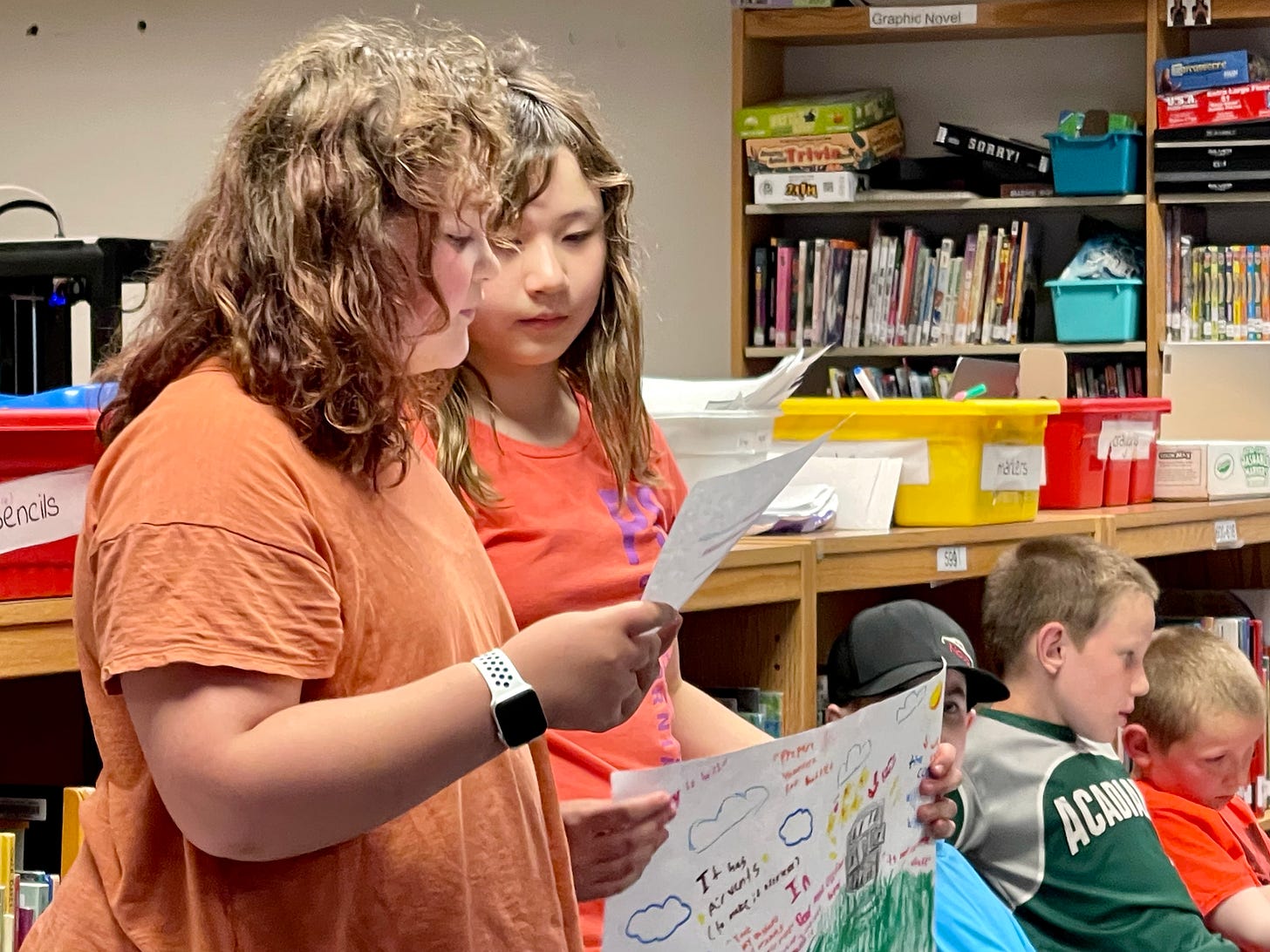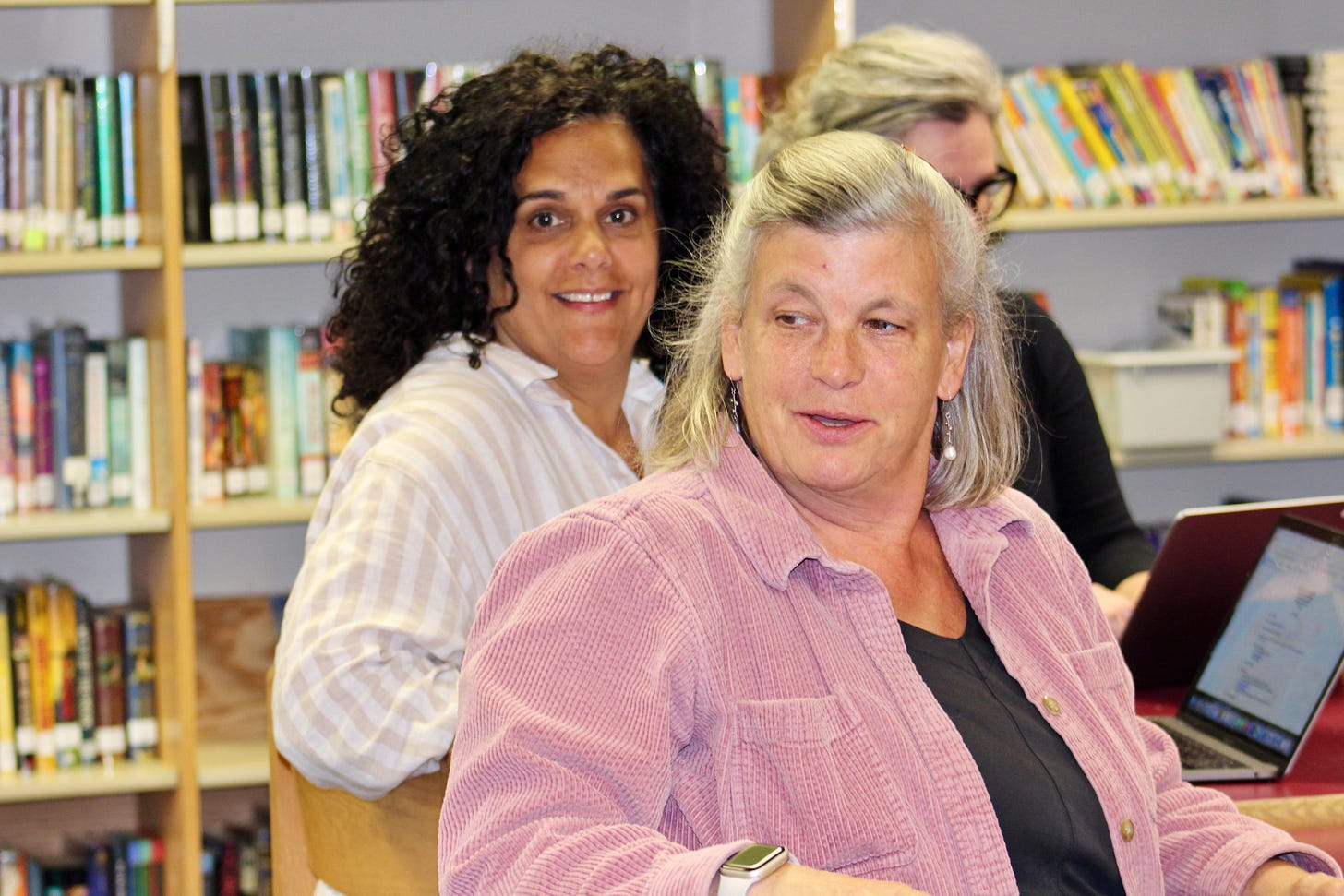The Secret of the 95 Pounds
Construction bids, principal contract extended, and some amazing fourth graders
BAR HARBOR—In groups of twos and threes, fourth graders told the Bar Harbor School Committee, Principal Dr. Heather Weir Webster, and Superintendent Michael Zboray how they planned to make change in the world.
And they decided to start at their school.
The fourth graders were motivated by their teacher, Heather Dority, who as part of the Change Maker Project, had them study someone in the world who made change. Then, they thought of how they themselves could make change.
So, they looked at sustainable systems, composting systems, took a trash inventory at their school, and looked at food waste.
What did they find when they looked at the waste in the lunch room?
“We saw that it was 95 pounds of trash and we saw that half of it could have gone in the compost,” Vera told the attendees at the Bar Harbor School committee on Monday.
The 95 pounds wasn’t a secret, not really; it was just an unknown until the fourth graders sleuthed it out.
There are over 95,000 schools in the United States. Each serve lunch. Some serve breakfast. The waste mounts. It can be accumulated by simple choices like students taking milk at lunch when they hate milk and won’t drink it, but think that they have to take milk.
According to Inverse, “About 530,000 tons of food and 45 million gallons of milk is wasted in U.S. school cafeterias each year, the World Wildlife Fund estimates, which translates into about $1.7 billion worth of uneaten food.”
That’s a problem, the Conners Emerson fourth graders said, because food waste releases methane.
“Methane,” James explained, “is bad for the earth because it’s able to trap heat in the atmosphere.”
A greenhouse gas, methane traps 28 times more heat in the Earth’s atmosphere than carbon dioxide.
Approximately 60,000 tons of food waste was left in Maine landfills in 2022. That rotting food created at least 2,000 tons of methane.
It’s estimated that in Maine there was a surplus of 425,000 tons of food created in that same year. Of that, approximately 1/3 was composted, turned into animal feed, used for industry, put on the land or donated. The rest was either dumped, went into the sewer, not harvested, incinerated, or put in a landfill.
Bar Harbor’s 2022-23 budget allocated $614,000 for the disposal of approximately 10 million pounds of trash and recycling. However, that disposal depends partially on an unpredictable global recycling market. For environmentalists, another worry is that the waste stream (both waste disposal and recycling) creates a large amount of carbon emissions from the disposal, recycling, transportation, and even the packaging and production of products.
So, it wasn’t just enough for the students to find a problem. They wanted to solve the problem, too, and look at options such as wooden bin composting and other compost options. They also wanted to figure out how to educate the rest of the school about what wasting food does so that they could start to reduce those daily pounds of trash.
They said that they’d like to compost the hopefully diminished amount of food waste at Agricycle, which offered twice weekly pick-up at potentially $1,000 a year, which means that the amount would have to be budgeted. They aren’t currently aware what it costs to put all that trash into the waste stream now. Then, they’d like to use the compost at the school’s greenhouse.
Chair Alexandra Simis asked if learning about composting made the students more motivated to have composting at home. The question elicited a chorus of answers.
“Yeah definitely.”
“We do.”
“My house already has a compost.”
“My house has a compost.”
Maybe, they thought, it’s time the school had a system for composting, too.
At a meeting hosted by the Mount Desert Historical Society earlier this spring, Bar Harbor Task Force on the Climate Emergency member Ezra Sassaman said, “Waste is a big issue that we've been talking about recently because the town of Bar Harbor realized that a huge expense for the town is just how much waste we've been producing and sending to landfills.
“That's costing a ton, a lot, of money. So food waste, instead of just going to a landfill, can get sent to farms and gardens and reusable materials can be repaired and repurposed instead of also going to landfills.”
A pilot program run by the University of Maine took a waste audit at four public elementary schools in Maine. A slideshow explained to students that they didn’t have to take everything offered in the school cafeteria. It also linked the environment to food waste.
In nine weeks, food waste decreased by 14 percent. That equaled a quarter ton of food, according to Inverse. The researchers theorized that if the program was across the state, it could reduce food waste by 325 tons each year. That’s 4,263 tons of carbon dioxide or 1,000 cars no longer driving.
In 2020 Congresswoman Chellie Pingree (D-Maine) introduced legislation to cut school waste.
“One in five kids in Maine doesn’t have enough to eat, while schools and universities generate more than 7 million pounds of food waste every year,” Pingree said. “The school system offers a tremendous opportunity for students to think outside the box, reduce hunger, and cut greenhouse gas emissions. This bill will help ensure school meals feed children, rather than ending up in landfills.”
This spring Dority’s fourth graders began that process, looking hard at their habits, the impact, and the possibilities to make change in their school and possibly beyond it.
“Reducing food waste can increase efficiency, save money, serve people, and promote better environmental outcomes. The rate of food waste at schools mirrors the rate of food waste by consumers, which is one of key places in the food system where food is wasted in the U.S.,” said Emily Broad Leib, Director, Harvard Law School Food Law and Policy Clinic.
The fourth graders have found the secret of the food waste. Now, they’re determined to make change and solve the problem.
OTHER SCHOOL NEWS
WEBSTER CONTRACT EXTENDED
The final action item of the agenda on Monday was the extension of Dr. Heather Weir Webster’s contract with the schools.
Principals are on three-year contracts. Her contract was extended to 2027 by a unanimous vote of the board.
“We are lucky to have her!” Superintendent Michael Zboray said.
BIDS FOR NEW SCHOOL BUILDING

Zboray said that Harriman received a question from a contractor bidding to extend the bid deadline for the construction of the new school by one week. They agreed to that because they want to get all potential bids. The new date for opening the bids is June 20, at 2 p.m at Zboray’s office. The choice of the bids will occur one week later. That meeting is not yet scheduled.
OFFICERS
Chair Alexandra Simis and Vice Chair Marie Yarborough were elected chair and vice chair and were unanimously voted in as a slate, returning to their positions for the next year. Yarborough is running opposed in the June 11 election for her seat.
The school currently has 351 students. It’s Maine Science assessments are complete. They are gathering a lot of data this year and organizing and analyzing it for teachers.
“You don’t become a teacher to read from a book. You become a teacher because you realize what you can offer,” Dr. Heather Weir Webster said.
But this year, they’ve turned a corner and data is a great thing, she said. “Data is not this gotcha.”
The difference, she said, is that “we’re using our interventionists as coaches.” Data is a way to help and when it’s perceived that way, teachers are no longer defensive about test scores.
Upcoming Events:
June 6th is NOT an early release day (due to snow days)
June 7th- Promotion Ceremony @ 4:30
June 10th- Field Day Rain Date
June 11th- Field Day
June 12th- Step Up Day/Last Day of School (Early Release at 12:30pm)
NATIONAL RESOURCES COUNCIL OF MAINE-PLASTIC POLLUTION
https://www.nrcm.org/programs/sustainability/plastic-pollution/
Read about the College of the Atlantic’s zero-waste efforts here.
https://www.coa.edu/about/environmental-commitment/waste-management/
Bar Harbor’s Solid Waste and Recycling Division is here.
http://barharbormaine.gov/147/Solid-Waste-Recycling-Division
If you’d like to donate to help support us, you can, but no pressure! Just click here.
















